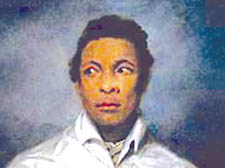|
|
 |
| |

Ira Aldridge |
An African Othello who shook the West End
IF the critics are to be believed, Chiwetel Ejiofor’s Othello – currently at the Donmar Warehouse – is incandescent, marvellous and worth every penny of the 600-odd pounds that tickets for the show are now changing hands for.
Whether that is true is a matter of opinion, but certainly Mr Ejiofor will not have to suffer racist reviews complaining about the size of his lips ruining the script or public rancour that Shakespeare’s Moor might be played by an African.
Yet for the 19th-century actor Ira Aldridge such tribulations were all in a day’s work. Born into a family of labourers in New York in 1807, Aldridge devoted himself to a life on the stage at a time when entrances to some theatres still carried signs warning: “Dogs and negroes forbidden.”
His struggle to overcome social prejudice and attain greatness in his art is the subject of an insightful new potted biography by Gospel Oak author Martin Hoyles.
“Aldridge was fascinating because he was presenting an alternative view to black people being inferior, which some people didn’t like,” Martin explains. “There was a big split in society at the time – a lot of the people had the interests of the planters at heart.”
The sheriff of New York was one such individual, arresting Ira and other black actors so freqently (sometimes off the stage itself) that it was commonplace for performances to continue in the jail cells.
After a rival white theatre attack closed the black Grove theatre for good, Ira journeyed to England, living for a while in Kentish Town.
To put the cultural split in England into perspective: at the Great Exhibition of 1851, held at Crystal Palace, the slave-turned-businessman Josiah Henson found himself the only black exhibitor, while under the same roof African slaves formed part of the exhibition.
Nevertheless Ira performed, receiving often ecstatic reviews. He was described as “the African Roscius”, famed for his Othello but praised as well for his Hamlet, Lear and Macbeth.
When the great Irish actor Edmund Kean fell ill in the opening week of Othello and died soon after, Aldridge stepped in. But news of a real African on the Covent Garden stage caused such outrage he played only three days.
He subsequently left England, winning numerous honours and awards (including a German knighthood) in Europe and Russia.
“A lot of people praised his performance even though they couldn’t understand the language – his acting was so convincing,” says Martin. “The 19th century is presented as a time of melodrama, with nothing serious on the stage, yet Aldridge is always an exception. He was a precursor to the method acting of the 20th century, but very few people know about him.”
SIMON WROE
|
 |
|
 |
 |
|
 |
|









